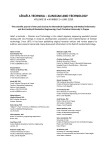-
Články
- Časopisy
- Kurzy
- Témy
- Kongresy
- Videa
- Podcasty
3D PRINTED HYDROGEL GLUCOSE SENSOR ON ARGON PLASMA ACTIVATED POLYSTYRENE
Autori: Nenad Krstic 1,2*; Jens Jüttner 1*; Achim Müller 3; Monika Knuth 3; Christiane Thielemann 1
Pôsobisko autorov: BioMEMS Lab, Faculty of Engineering, Technische Hochschule Aschaffenburg, Würzburger Str. 45, 63743 Aschaffenburg, Germany 1; Department of Chemistry, Faculty of Science and Mathematics, University of Nis, Visegradska 33, 18106 Nis, Serbia 2; EyeSense GmbH, Stockstädter Straße 17, 63762 Großostheim, Germany 3
Vyšlo v časopise: Lékař a technika - Clinician and Technology No. 2, 2020, 50, 45-48
Kategória: Původní práce
doi: https://doi.org/10.14311/CTJ.2020.2.01Súhrn
This study presents a proof of principle concept for a two-dimensional bioprinted glucose sensor on Petri dishes that allows for glucose measurements in cell culture medium. To improve bioink adhesion, the polystyrene surfaces of standard Petri dishes are activated with argon plasma, which increases roughness and hydrophilicity. The bioink containing the sensor chemistry—namely fluorescently labeled ConA/Dextran embedded in alginate microbeads—was printed on the activated Petri dishes with an extrusion-based bioprinter. The printed sensor showed good stability and adhesive properties on polystyrene. The glucose concentration was examined using a standard fluorescence microscope with filters adapted to the emission wavelength of the donor and reference dyes. The printed glucose sensor showed high sensitivity and good linearity in a physiologically relevant range of glucose concentrations.
Klíčová slova:
bioprinted sensor – adhesion – Ar plasma – activated polystyrene – glucose measurement
Zdroje
- Müller AJ, Knuth M, Nikolaus KS, Krivánek R, Küster F, Hasslacher C, Auffarth GU. Blood glucose self-monitoring with a long-term subconjunctival glucose sensor. Journal of Diabetes Science and Technology, Jan 2013;7(1):24 34. DOI: 10.1177/193229681300700104
- Lee H, Hong YJ, Baik S, Hyeon T, Kim DH. Enzyme‐based glucose sensor: from invasive to wearable device. Advanced healthcare materials. 2018 Apr;7(8):1701150. DOI: 10.1002/adhm.201701150
- Sharafeldin M, Jones A, Rusling JF. 3D-printed biosensor arrays for medical diagnostics. Micromachines. 2018 Aug;9(8): 394. DOI: 10.3390/mi9080394
- Wang J. Glucose biosensors: 40 years of advances and challenges. Electroanalysis: An International Journal Devoted to Fundamental and Practical Aspects of Electroanalysis. 2001 Aug;13(12):983–8. DOI: 10.1002/1521-4109(200108)13 : 12<983::AID-ELAN983>3.0.CO;2-%23
- Makaram P, Owens D, Aceros J. Trends in nanomaterial-based non-invasive diabetes sensing technologies. Diagnostics. 2014 Jun;4(2):27–46. DOI: 10.3390/diagnostics4020027
- Badugu R, Lakowicz JR, Geddes CD. Fluorescence sensors for monosaccharides based on the 6-methylquinolinium nucleus and boronic acid moiety: potential application to ophthalmic diagnostics. Talanta. 2005 Feb 15;65(3):762–8. DOI: 10.1016/j.talanta.2004.08.003
- Senior M. Novartis signs up for Google smart lens. September 2014;32(9):856. DOI: 10.1038/nbt0914-856
- Liu C, Sheng Y, Sun Y, Feng J, Wang S, Zhang J, Xu J, Jiang D. A glucose oxidase-coupled DNAzyme sensor for glucose detection in tears and saliva. Biosensors and Bioelectronics. 2015 Aug 15;70 : 455–61. DOI: 10.1016/j.bios.2015.03.070
- Bandodkar AJ, Wang J. Non-invasive wearable electro-chemical sensors: a review. Trends in biotechnology. 2014 Jul 1;32(7):363–71. DOI: 10.1016/j.tibtech.2014.04.005
- Bruen D, Delaney C, Florea L, Diamond D. Glucose sensing for diabetes monitoring: recent developments. Sensors. 2017 Aug; 17(8):1866. DOI: 10.3390/s17081866
- Tric M, Lederle M, Neuner L, Dolgowjasow I, Wiedemann P, Wölfl S, Werner T. Optical biosensor optimized for continuous in-line glucose monitoring in animal cell culture. Analytical and bioanalytical chemistry. 2017 Sep 1;409(24):5711–21. DOI: 10.1007/s00216-017-0511-7
- Olivo J, Foglia L, Casulli MA, Boero C, Carrara S, De Micheli G. Glucose and lactate monitoring in cell cultures with a wire-less android interface. In2014 IEEE Biomedical Circuits and Systems Conference (BioCAS) Proceedings 2014 Oct 22 (pp. 400–403). IEEE. DOI: 10.1109/BioCAS.2014.6981747
- Ballerstadt R, Schultz JS. A fluorescence affinity hollow fiber sensor for continuous transdermal glucose monitoring. Analytical Chemistry. 2000 Sep 1;72(17):4185–92. DOI: 10.1021/ac000215r
- Müller AJ, Knuth M, Nikolaus KS, Herbrechtsmeier P. First clinical evaluation of a new long-term subconjunctival glucose sensor. Journal of diabetes science and technology. 2012 Jul; 6(4):875–83. DOI: 10.1177/193229681200600419
- Chen L, Hwang E, Zhang J. Fluorescent Nanobiosensors for Sensing Glucose. Sensors. 2018 May;18(5):1440. DOI: 10.3390/s18051440
- Jüttner J, Kress L. Functionalized Hydrogel as Glucose Imaging Sensor for in vitro Cell Cultures. International Student Scientific Conference POSTER 2019, Praque, May 23,1–3.
- Bitar R, Cools P, De Geyter N, Morent R. Acrylic acid plasma polymerization for biomedical use. Applied Surface Science. 2018 Aug 1;448 : 168–85. DOI: 10.1016/j.apsusc.2018.04.129
- Levif P, Seguin J, Moisan M, Barbeau J. Influence of substrate materials on inactivation of B. atrophaeus endospores in a reduced-pressure argon plasma. Plasma Processes and Polymers, 2011 May 3;8(617–630). DOI: 10.1002/ppap.201000212
- Guruvenket S, Rao GM, Komath M, Raichur AM. Plasma surface modification of polystyrene and polyethylene. Applied surface science. 2004 Sep 15;236(1–4):278–84. DOI: 10.1016/j.apsusc.2004.04.033
- Smirnov AV, Atkin VS, Gorbachev IA, Grebennikov AI, Sinev IV, Simakov VV. Surface modification of polystyrene thin films by RF plasma treatment. BioNanoScience. 2017 Dec 1; 7(4):680–5. DOI: 10.1007/s12668-017-0407-1
Štítky
Biomedicína
Článok vyšiel v časopiseLékař a technika

2020 Číslo 2-
Všetky články tohto čísla
- 3D PRINTED HYDROGEL GLUCOSE SENSOR ON ARGON PLASMA ACTIVATED POLYSTYRENE
- PREMATURE INFANT BLOOD VESSEL SEGMENTATION OF RETINAL IMAGES BASED ON HYBRID METHOD FOR THE DETERMINATION OF TORTUOSITY
- THE EFFECT OF FOOTWEAR TO THE POSTURE
- THE CHANGE OF CARDIOSTIMULATION DEVICE PROGRAMMING DUE TO DETECTION OF ELECTROMAGNETIC INTERFERENCE
- INAPPROPRIATE S-ICD PATIENT RECEIVES FALSE POSITIVE SHOCKS
- Lékař a technika
- Archív čísel
- Aktuálne číslo
- Informácie o časopise
Najčítanejšie v tomto čísle- THE EFFECT OF FOOTWEAR TO THE POSTURE
- THE CHANGE OF CARDIOSTIMULATION DEVICE PROGRAMMING DUE TO DETECTION OF ELECTROMAGNETIC INTERFERENCE
- PREMATURE INFANT BLOOD VESSEL SEGMENTATION OF RETINAL IMAGES BASED ON HYBRID METHOD FOR THE DETERMINATION OF TORTUOSITY
- INAPPROPRIATE S-ICD PATIENT RECEIVES FALSE POSITIVE SHOCKS
Prihlásenie#ADS_BOTTOM_SCRIPTS#Zabudnuté hesloZadajte e-mailovú adresu, s ktorou ste vytvárali účet. Budú Vám na ňu zasielané informácie k nastaveniu nového hesla.
- Časopisy



